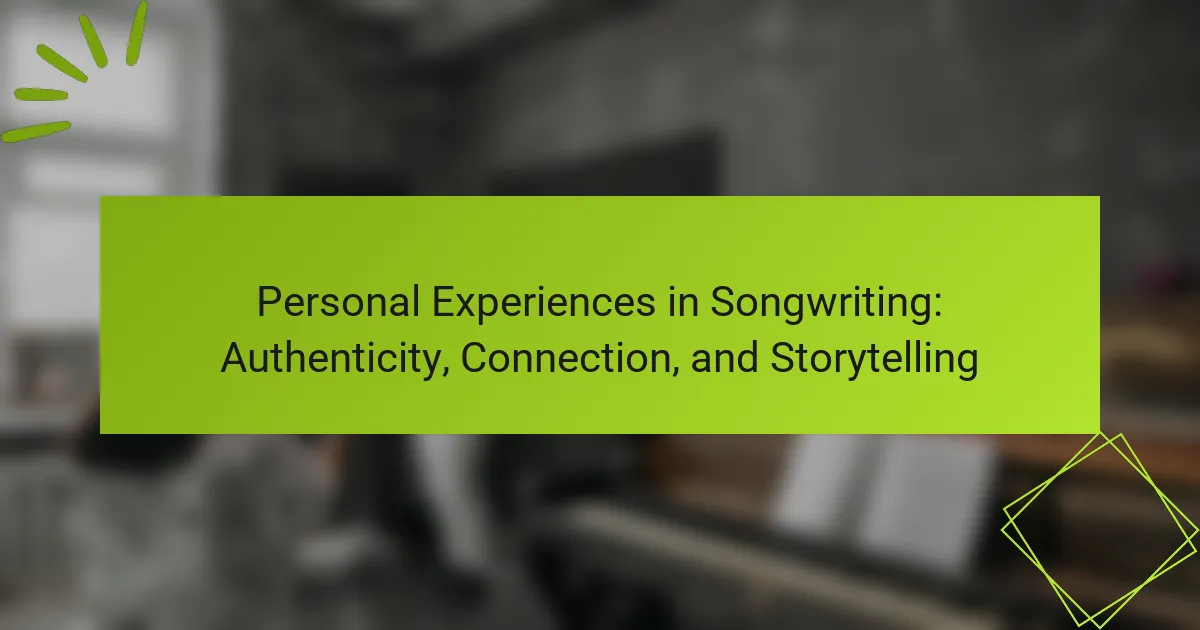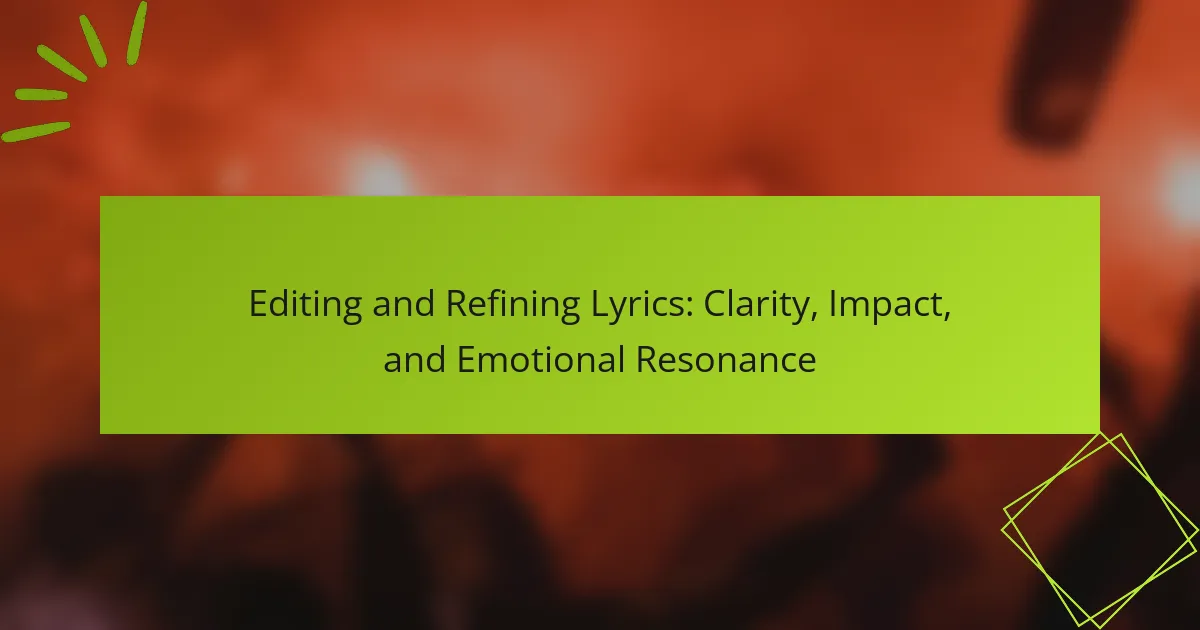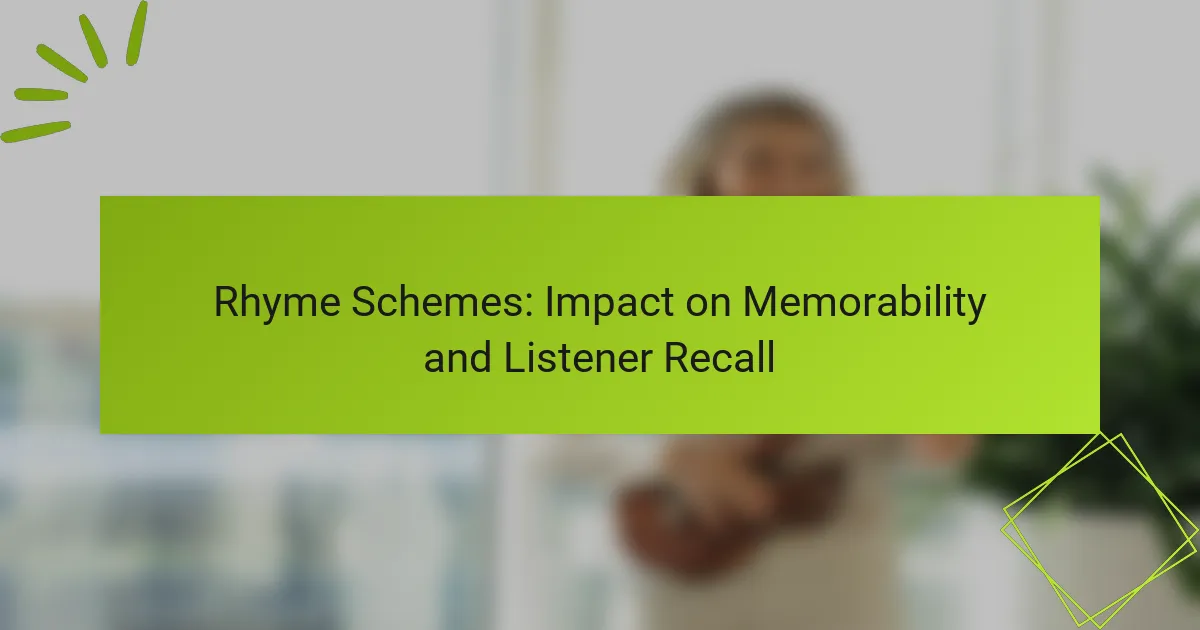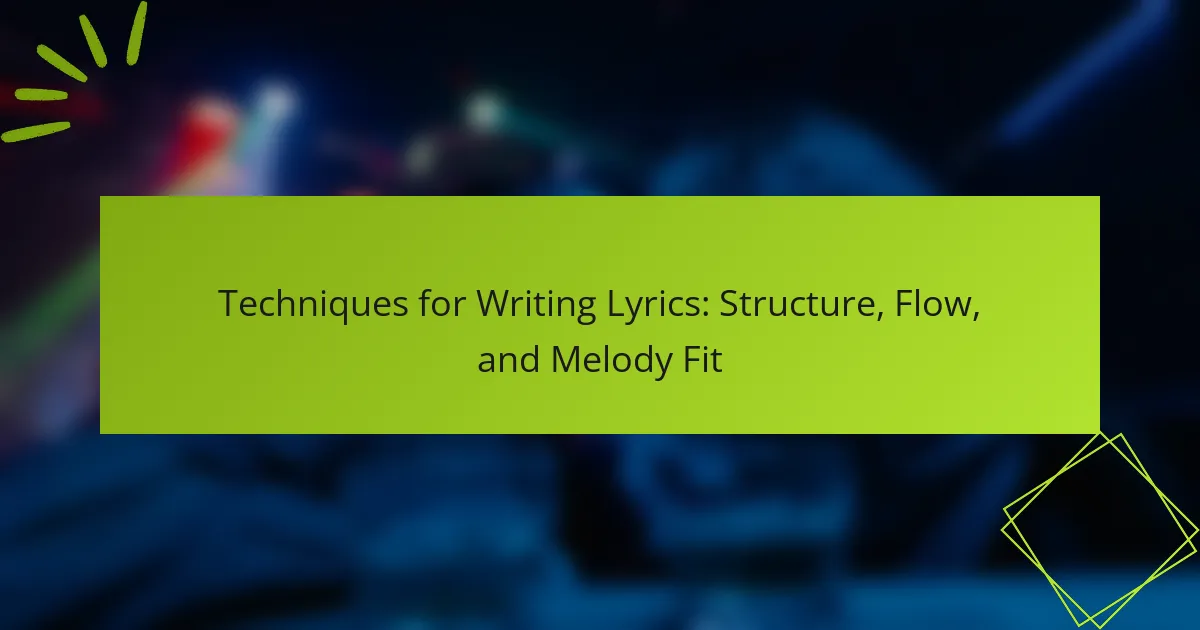Songwriting is an intimate journey that thrives on authenticity, allowing artists to weave personal experiences into their music. In a vibrant city like Los Angeles, this genuine expression fosters deep emotional connections with listeners, transforming songs into shared stories. By embracing storytelling and engaging with audiences, songwriters can create impactful narratives that resonate and build a sense of community.

How can authenticity enhance songwriting in Los Angeles?
Authenticity in songwriting can significantly deepen the emotional impact of music in Los Angeles, a city known for its diverse artistic landscape. By drawing from personal experiences and genuine emotions, songwriters can create connections with listeners that resonate on a profound level.
Emotional resonance in lyrics
Emotional resonance in lyrics is crucial for engaging listeners. When songwriters infuse their work with authentic feelings, it allows the audience to relate to the themes and narratives presented. For example, expressing vulnerability in a breakup song can evoke empathy and connection, making the music more memorable.
To enhance emotional resonance, consider using vivid imagery and personal anecdotes. This approach can transform abstract feelings into relatable experiences. Aim for lyrics that evoke strong emotions, whether joy, sadness, or nostalgia, to create a lasting impact.
Personal storytelling techniques
Personal storytelling techniques are essential for crafting compelling songs. By weaving personal narratives into lyrics, songwriters can create a unique voice that stands out in the competitive Los Angeles music scene. Techniques such as using specific details, dialogue, and a clear narrative arc can bring stories to life.
When writing, focus on authenticity by sharing real experiences and emotions. Avoid clichés and strive for originality; this can help your songs resonate more deeply with listeners. Consider incorporating local references or experiences that reflect the vibrant culture of Los Angeles, making the storytelling even more relatable.
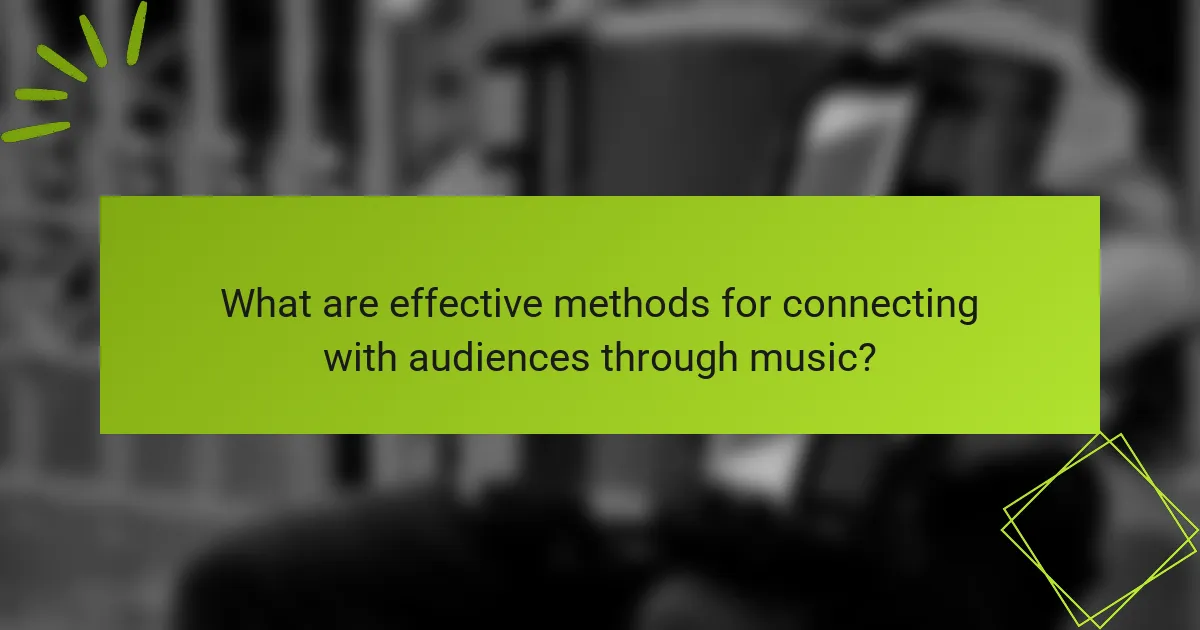
What are effective methods for connecting with audiences through music?
Connecting with audiences through music involves creating emotional resonance and fostering a sense of community. Effective methods include engaging performances and leveraging social media to interact with fans.
Engaging live performances
Live performances are a powerful way to connect with audiences, as they provide an opportunity for shared experiences. Musicians can enhance engagement by incorporating storytelling elements, inviting audience participation, and varying their setlists to keep the energy fresh.
Consider using techniques like call-and-response or crowd sing-alongs to create a sense of unity. Additionally, tailoring performances to the local culture or venue can deepen the connection, making the audience feel valued and included.
Utilizing social media for interaction
Social media platforms are essential tools for musicians to connect with their audience outside of live events. Regularly posting updates, behind-the-scenes content, and engaging directly with fans through comments or messages fosters a sense of community and loyalty.
Utilize features like polls, Q&A sessions, or live streams to encourage interaction. Be mindful of the platform’s demographics; for instance, younger audiences may prefer TikTok, while older fans might engage more on Facebook. Consistency and authenticity in your online presence are key to building lasting connections.
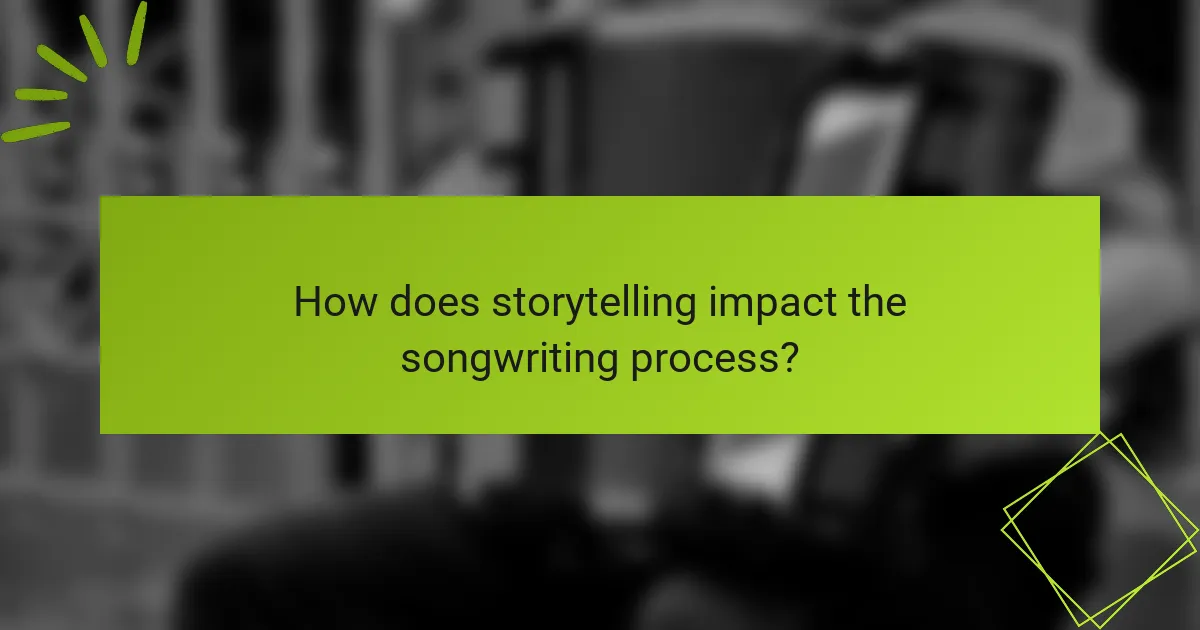
How does storytelling impact the songwriting process?
Storytelling significantly enhances the songwriting process by creating emotional depth and connection with listeners. It allows songwriters to convey experiences and feelings in a way that resonates, making the music more relatable and impactful.
Creating relatable narratives
Relatable narratives in songwriting draw listeners in by reflecting common human experiences. When a songwriter crafts a story that mirrors the audience’s own feelings or situations, it fosters a sense of connection and understanding. For instance, themes of love, loss, or personal growth are universally recognized, making them effective storytelling devices.
To create relatable narratives, consider using vivid imagery and specific details that evoke emotions. Think about moments in your life that others might share, and weave those into your lyrics. This approach not only enhances authenticity but also invites listeners to see themselves in the story.
Incorporating personal experiences
Incorporating personal experiences into songwriting adds authenticity and uniqueness to the music. When songwriters share their own stories, it creates a genuine connection with the audience, as listeners can often sense the truth behind the lyrics. This authenticity can set a song apart in a crowded music landscape.
To effectively incorporate personal experiences, reflect on significant moments in your life and how they shaped your emotions. Use these experiences as a foundation for your lyrics, focusing on the feelings and lessons learned. Avoid overly complex narratives; simplicity often resonates more deeply with listeners.
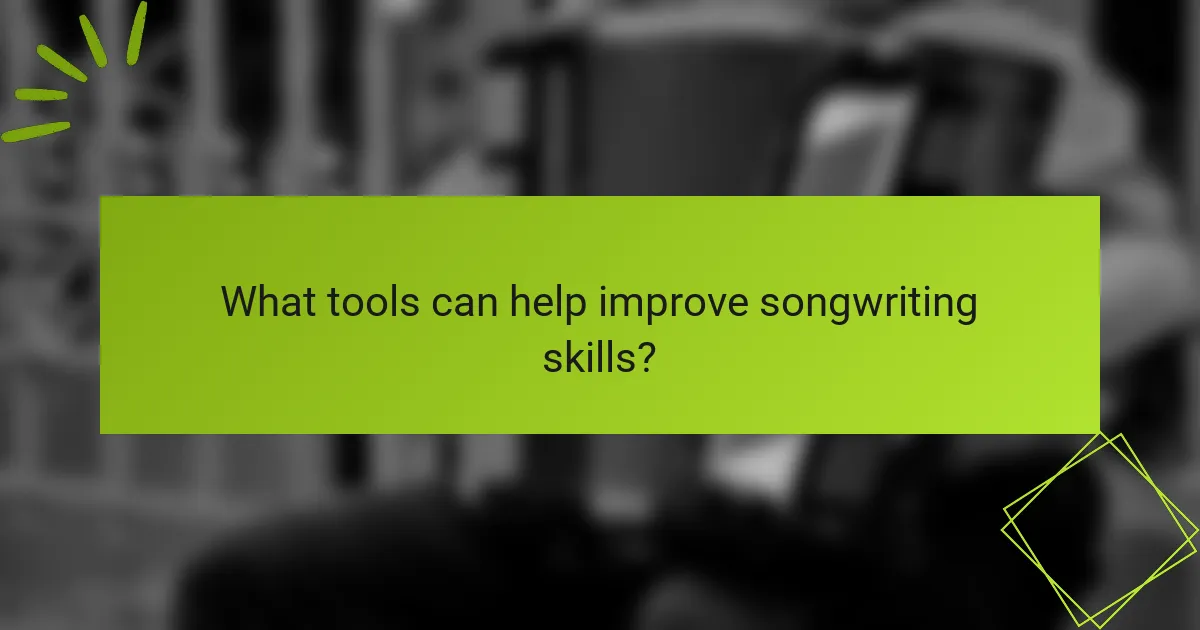
What tools can help improve songwriting skills?
Improving songwriting skills can be greatly facilitated by utilizing various tools that enhance creativity, collaboration, and organization. Digital platforms and collaborative apps are particularly effective in fostering new ideas and refining your craft.
Using digital platforms like Soundtrap
Soundtrap is a versatile digital audio workstation that allows songwriters to create music online. It offers a user-friendly interface with features like loops, virtual instruments, and real-time collaboration, making it easy to experiment with different sounds and styles.
To get started, sign up for an account and explore the available tools. You can create a new project, add tracks, and invite collaborators to work together. This platform is especially beneficial for those who prefer a cloud-based solution, as it enables access from anywhere with an internet connection.
Collaborative songwriting apps
Collaborative songwriting apps, such as BandLab and Kompoz, provide a space for musicians to connect and create together, regardless of their physical location. These platforms often include features for sharing ideas, recording vocals, and adding instrumental tracks, facilitating a seamless collaborative process.
When using these apps, consider setting clear goals for your collaboration to ensure everyone is on the same page. Regular communication through comments or chat features can help maintain momentum and keep the creative flow going. Additionally, be open to feedback and different perspectives, as this can lead to more innovative songwriting outcomes.
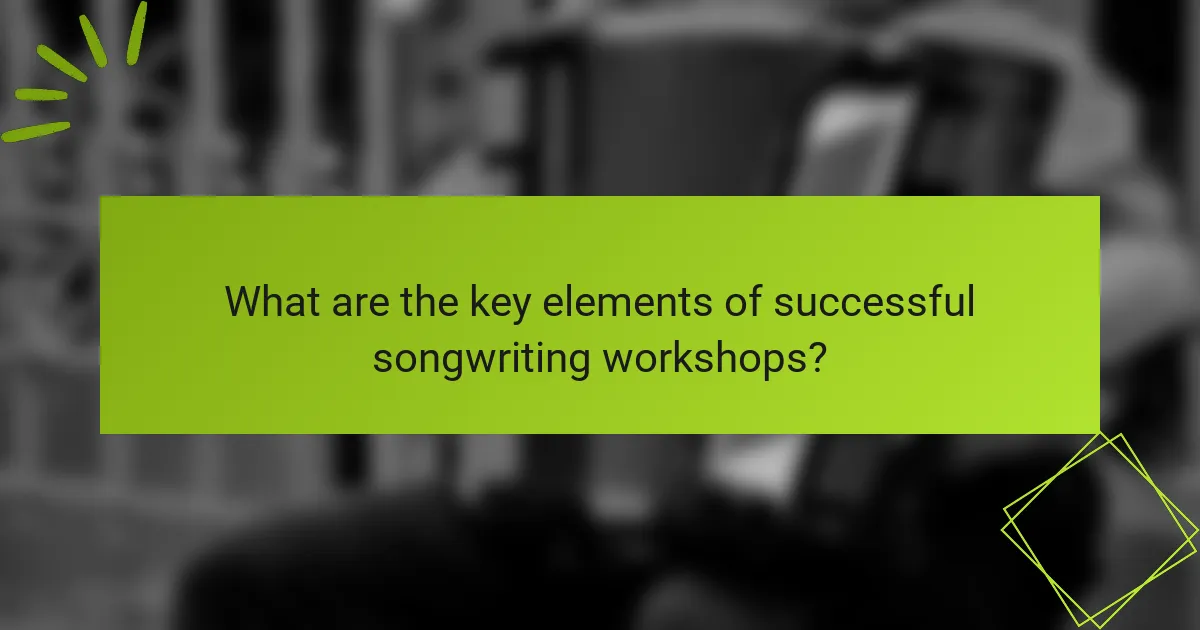
What are the key elements of successful songwriting workshops?
Successful songwriting workshops typically focus on three key elements: feedback and critique sessions, networking opportunities with industry professionals, and hands-on songwriting exercises. These components foster creativity, enhance skills, and build valuable connections within the music industry.
Feedback and critique sessions
Feedback and critique sessions are essential for refining songwriting skills. Participants share their work and receive constructive criticism from peers and instructors, which helps identify strengths and areas for improvement. This process encourages open dialogue and fosters a supportive environment where songwriters can grow.
To maximize the benefits of feedback sessions, be open to suggestions and willing to revise your work. Aim to provide specific, actionable feedback to others, as this not only helps them but also sharpens your own analytical skills. Remember, the goal is to enhance the quality of your songwriting.
Networking opportunities with industry professionals
Networking opportunities with industry professionals are a vital aspect of songwriting workshops. These interactions can lead to collaborations, mentorships, and even job opportunities in the music industry. Engaging with established songwriters, producers, and agents can provide insights into the industry and help you navigate your career path.
To make the most of networking opportunities, be proactive in introducing yourself and sharing your work. Attend workshops with an open mind and a willingness to learn from others. Follow up with connections after the event to maintain relationships and explore potential collaborations.
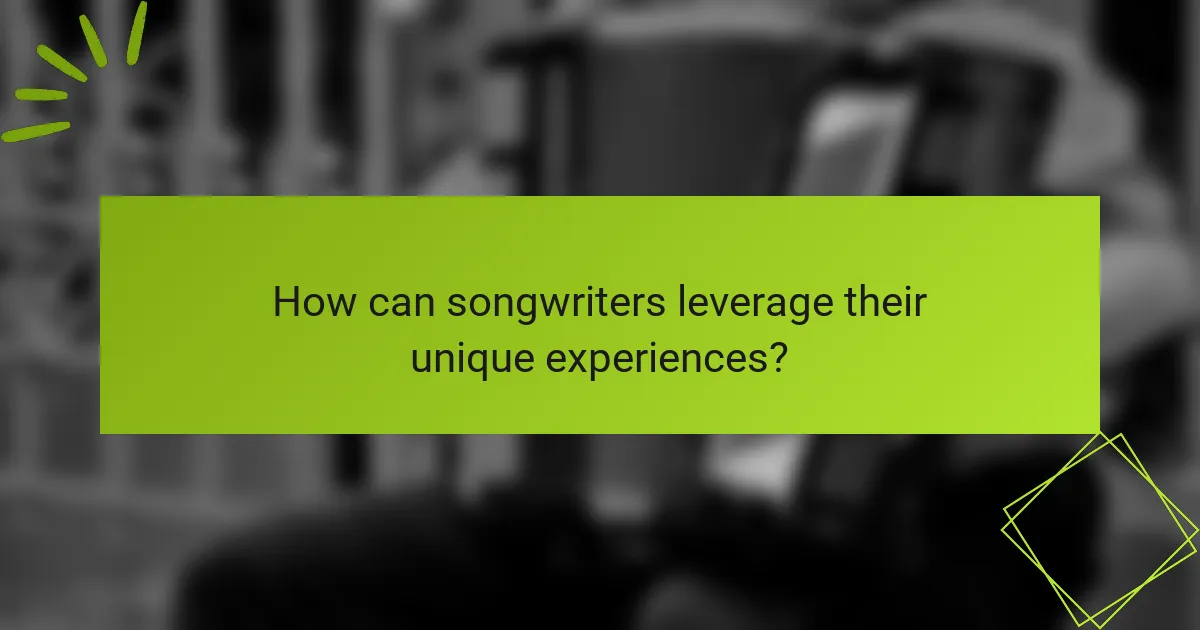
How can songwriters leverage their unique experiences?
Songwriters can effectively leverage their unique experiences by infusing personal stories and emotions into their music. This authenticity fosters a deeper connection with listeners, making the songs more relatable and impactful.
Building a personal brand
To build a personal brand, songwriters should focus on their distinct voice and storytelling style. This involves consistently presenting their experiences and perspectives through their music, visuals, and social media presence. Authenticity is key; fans are drawn to artists who share genuine stories that resonate with their own lives.
Engaging with audiences through live performances or online platforms can further strengthen a songwriter’s brand. Regular interaction helps to create a loyal fanbase and encourages listeners to invest emotionally in the artist’s journey.
Crafting niche musical styles
Songwriters can carve out a niche by blending their unique experiences with specific musical genres. For example, an artist with a background in folk traditions might incorporate storytelling elements into contemporary pop, creating a fresh sound that stands out in the market.
Exploring various styles and experimenting with different instruments can also help define a niche. Songwriters should consider their influences and how these can be woven into their music, allowing them to create a distinctive sound that reflects their personal narrative.
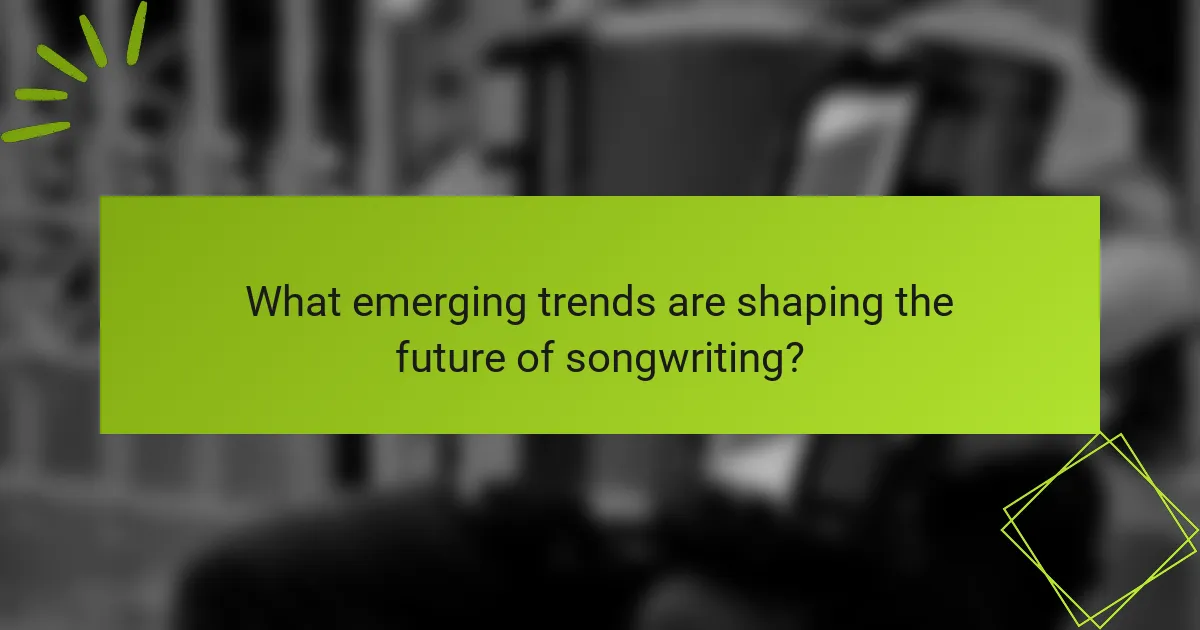
What emerging trends are shaping the future of songwriting?
Emerging trends in songwriting are increasingly influenced by technology, collaboration, and the demand for authenticity. These factors are reshaping how songs are created, produced, and consumed, leading to new opportunities for artists to connect with their audiences.
Integration of technology in music creation
The integration of technology in music creation has transformed songwriting into a more accessible and collaborative process. Tools like digital audio workstations (DAWs), virtual instruments, and AI-assisted songwriting applications enable musicians to experiment with sounds and structures without needing extensive studio resources.
Songwriters can now collaborate remotely using cloud-based platforms, allowing for real-time feedback and contributions from multiple artists across different locations. This shift not only broadens the creative possibilities but also fosters a sense of community among songwriters.
However, it’s essential to balance technology with personal expression. Relying too heavily on automated tools can lead to generic outcomes. Songwriters should use technology as a means to enhance their unique voice rather than replace it.
